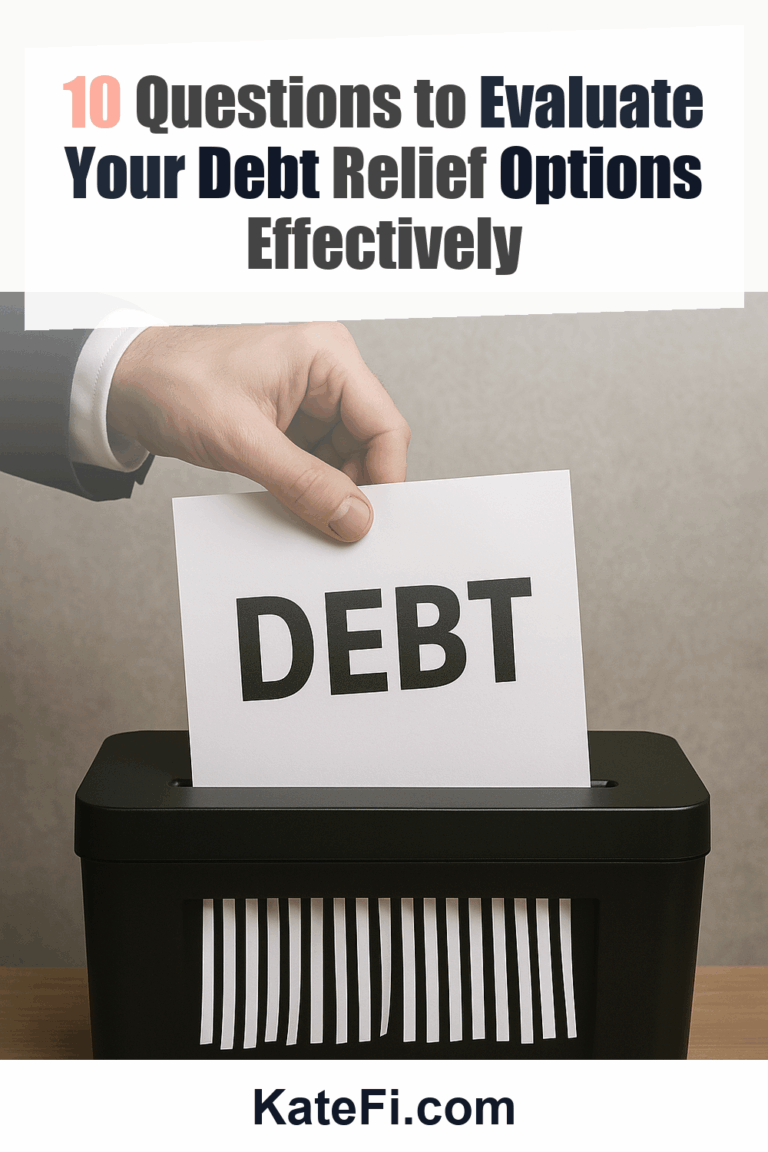Understand pros/cons of settlement vs consolidation vs DMP for your exact mix of debts.
Love our content? Show your support by following us — pretty please!🥺
FOLLOW ON PINTEREST
Hi! I’m Kate, the face behind KateFi.com—a blog all about making life easier and more affordable.
Not available in IL, KS, OR, TN, UT, WV.
10 Questions to Evaluate Your Debt Relief Options Effectively
Are you feeling overwhelmed by debt and unsure where to turn? You’re not alone. Many people find themselves in similar situations, and navigating the world of debt relief can be challenging. Unfortunately, it can also be a minefield filled with scams that prey on your vulnerabilities. To help you find legitimate solutions, we’ve put together a comprehensive list of ten crucial questions to ask yourself before deciding on a debt relief option.
But first, it’s essential to get a clear understanding of your options. That’s why we highly recommend getting a free consultation to review your situation and find the most suitable path forward. A professional can help guide you away from scams and toward credible solutions.
1. What Are My Total Debts?
Before you can make informed decisions, it’s crucial to assess the full scope of your debts. List all your debts, including credit cards, loans, and any other financial obligations.
#### Checklist:
- Gather all bills and statements.
- Note down the balance, minimum monthly payment, and interest rates.
2. What Are My Monthly Expenses?
Understanding your monthly expenses is equally important. This includes rent or mortgage payments, utilities, groceries, and transportation. Knowing how much money you need for day-to-day living can help you figure out how much you can allocate towards debt relief.
#### Checklist:
- Create a monthly budget.
- Keep track of discretionary spending to see if you can cut back.
3. Am I Considering the Right Debt Relief Options?
Debt relief comes in various forms—debt settlement, credit counseling, debt consolidation, and bankruptcy, among others. It’s essential to educate yourself on these options and identify which is most suitable for your financial situation.
#### Common Options:
| Debt Relief Option | Description | Potential Risks |
|---|---|---|
| Debt Settlement | Negotiating a lower total amount to pay off debts. | May impact credit score and require a lump sum payment. |
| Credit Counseling | Working with a counselor to create a repayment plan. | No guarantee creditors will accept the plan. |
| Debt Consolidation | Combining multiple debts into one loan with a lower rate. | Risks of accumulating more debt if not managed well. |
| Bankruptcy | Legal proceeding to eliminate debts. | Long-term impact on credit and possible loss of assets. |
4. How Will This Affect My Credit Score?
Understanding the potential impact on your credit score is vital. Different debt relief options can have varying effects on your credit rating. It’s essential to weigh the short-term hit against the long-term benefits of becoming debt-free.
#### Key Points:
- Debt settlement can lower your score significantly.
- Bankruptcy may stay on your credit report for up to 10 years.
- Working with a credit counselor might improve your credit over time.
5. Are the Debt Relief Services Legitimate?
Scammers often take advantage of individuals in financial distress. Make sure any debt relief service you consider is reputable and transparent about their services, fees, and processes.
#### Checklist:
- Research the company online.
- Read reviews and testimonials.
- Check for accreditations and memberships in relevant associations.
6. What Are the Fees Associated With This Option?
Legitimate debt relief services will always disclose their fees upfront. Be cautious of any company that demands large sums of money before providing services.
#### Questions to Ask:
- What is the total cost of the service?
- Are there any hidden fees?
- When are payments due?
7. Do I Have All the Necessary Documentation?
Being organized can expedite the process. Before consulting with any debt relief company, gather relevant documents that they may need to evaluate your situation.
#### Documents to Collect:
- Recent bank statements
- Pay stubs or proof of income
- Credit card statements
- Loan agreements
- Any correspondence from creditors
8. What Is the Company’s Process for Handling My Debt?
A legitimate debt relief company should have a clear and structured process for how they will handle your debt. It’s essential to understand each step involved.
#### Checklist:
- How long will the process take?
- Will you be assigned a specific consultant?
- How often will you receive updates on your progress?
9. What Happens If I Don’t See Results?
Sometimes, the process may not go as planned. Ask the company what recourse you have if the agreed-upon results are not achieved.
#### Questions to Consider:
- Are there guarantees on outcomes?
- What steps will the company take if they cannot deliver results?
- How can I exit the program if I am not satisfied?
10. Am I Prepared for the Commitment?
Most debt relief options require time and dedication. Consider whether you can commit to the necessary steps to become debt-free.
#### Personal Reflection:
- Are you ready to make sacrifices to reduce your debt?
- Can you stick to a budget or payment plan for an extended period?
- Are you willing to work closely with a debt relief professional?
—
After considering these questions, you may feel more empowered to take the next step toward financial freedom. Remember, the journey to debt relief can be complex, but you don’t have to navigate it alone. Seeking professional help is crucial to avoid scams and make informed decisions.
✅ See If You Qualify for Debt Relief
Conclusion
Navigating debt relief requires due diligence, self-reflection, and education. The ten questions outlined above can serve as your roadmap for evaluating your options effectively. As you prepare to take these important steps, remember that help is available.
Take the time to research and consult with professionals who can assist you in making the best choices for your unique situation. We highly recommend getting a free consultation to review your debt relief options.
Important: This content is for education only—not legal, tax, or financial advice. Results and eligible programs vary by situation and state. Fees apply if you enroll and complete a program. Debt relief can affect credit; missed payments may lead to collections/lawsuits. Not available in IL, KS, OR, TN, UT, WV.
Remember, knowledge is power, and taking proactive steps today can lead to a brighter, debt-free future tomorrow!
What You’ll Learn on the Call
- Estimated timeline and monthly payment range
- How credit may be affected in the short term
- What documents to gather to move faster
Not available in IL, KS, OR, TN, UT, WV.






















